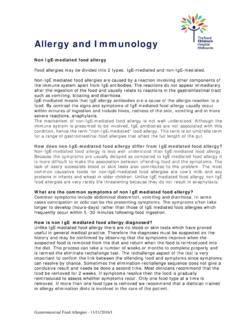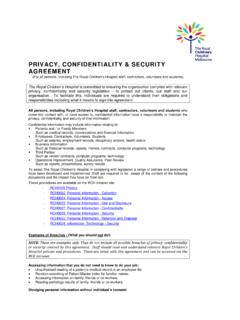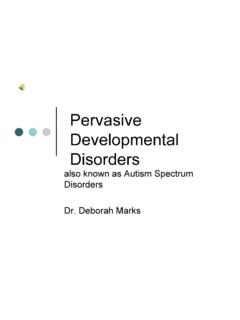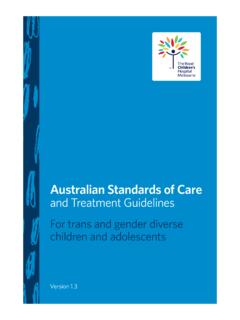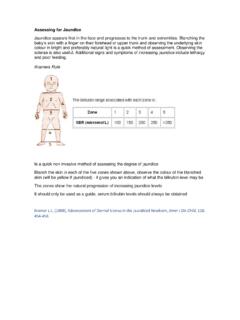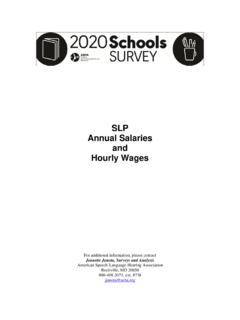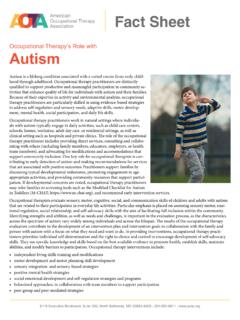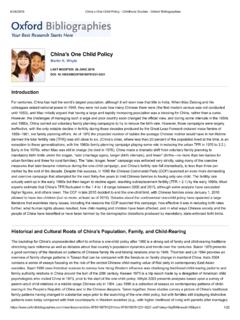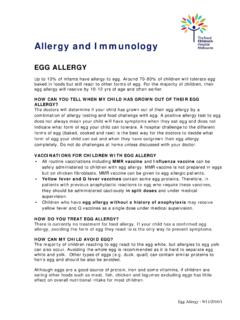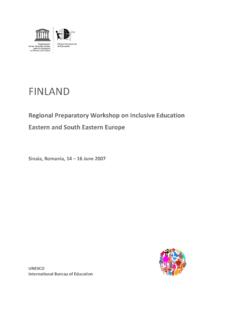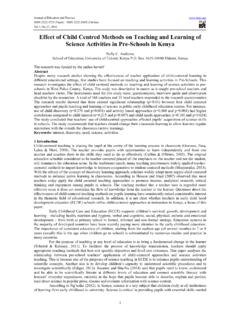Transcription of Allergy and Immunology - Royal Children's Hospital
1 Allergy and Immunology Cows Milk Allergy - 22/12/2016/1 COWS MILK Allergy Cows milk is one of the most common causes of food allergic reactions in children. Fortunately most children will outgrow their cows milk Allergy . HOW CAN YOU TELL WHEN MY CHILD HAS OUTGROWN THEIR COWS MILK Allergy ? The doctors will determine whether your child has grown out of their Allergy by a combination of Allergy testing and food challenge with milk. If your child has a type of Allergy that can be diagnosed with Allergy testing this may be used to monitor your child s allergies.
2 A positive Allergy test does not always mean your child will have symptoms when they have milk or milk products, therefore a challenge may be the only way to determine if your child has grown out of their Allergy . Challenges may need to be done in a Hospital by experienced medical staff. Do not do challenges at home unless instructed to do so by your doctor. HOW DO YOU TREAT COWS MILK Allergy ? There is currently no treatment for food Allergy . If your child has a confirmed cows milk Allergy avoiding milk and all milk containing foods is the only way to prevent symptoms.
3 HOW IS COWS MILK Allergy DIFFERENT TO LACTOSE INTOLERANCE? Lactose intolerance is when the body has difficulty digesting lactose, the natural SUGAR found in milk. Cows milk Allergy is when the immune system reacts to the PROTEIN in milk. Lactose free products still contain cows milk protein and are not suitable for people with cows milk Allergy . HOW CAN MY CHILD AVOID COWS MILK? Cows milk is found widely in the foods we eat therefore it is important to read and understand food labels to be able to choose foods that are safe for your child.
4 Other animal milks (goat and sheep) contain similar proteins to cows milk and should also be avoided. Heating and processing can change the proteins in foods making them less allergenic. Your child may be able to tolerate baked or processed forms of milk without reactions. Your doctor will advise you what forms of milk can be included. The following foods and ingredients DO NOT contain cows milk protein and can be eaten: Cocoa butter Cream of tartar Lactic acid- some lactic acid starter culture may however contain milk, so check labels carefully.
5 Lactose in medications- Lactose is the sugar contained in cows milk. The pure sugar form is used in medications. The chance of a person with milk Allergy reacting to pure lactose in medications is very low. Cows Milk Allergy - 22/12/2016/2 Foods and ingredients that contain cows milk protein A2 milk Butter Buttermilk Casein and caseinates Cheese Cheese powder Cheesybite spread Cheese spreads Condensed milk Cottage cheese Cream Cream cheese Curds Custard Dairy solids Evaporated milk Ghee, butter oil or butter fat Goat and sheep s milk Feta cheese Hydrolysates (casein, milk protein, whey)
6 Ice cream Infant formula (cows milk based including HA) Lactalbumin Lactoglobulin Lactose free milk Milk low fat, skim, A2, UHT Milk derivative Milk protein Milk solids Nonfat dairy or milk solids Probiotic drinks Ricotta cheese Skim milk solids Sustagen, Pediasure and other high protein drink powders Sour cream Whey Yoghurt Foods and ingredients likely to contain cows milk protein Baked goods biscuits, cakes, pastries Breads Breakfast cereals Canned spaghetti Caramel, fudge.
7 Butterscotch Chocolate Commercial baby foods Confectionary Crumbed and battered products Dips Gravy powders Fruit Juice drinks- high protein Infant feeding rusks Instant mashed potato Margarine Milk drink flavouring such as Milo and malted milk powder. Nougat Pasta sauces Potato products mash, salads and instant potato Processed meats-sausages, sandwich meats, hamburgers Sorbet and Gelati Salad dressings Soups Soy cheese Snack foods crisps, crackers LABEL READING Ingredients List All packaged foods must have an ingredients list.
8 You must check this ingredients list for any ingredients that may contain milk. It is law that all common food allergens (peanut, tree nut, seafood, fish, milk, eggs, soybeans and wheat) be clearly identified, however small the amount. Example: Instead of simply casein the ingredients list should read casein (milk) or milk casein. ALWAYS Check the ingredients list every time you buy the food as the ingredients of the product may change. Cows Milk Allergy - 22/12/2016/3 May contain traces of milk statements These statements are used by manufacturers to indicate that the product may be contaminated with milk through processing and packaging.
9 At present these statements are voluntary and there are no clear guidelines for companies regarding how and when to use them. The wording of the statements makes it very difficult to determine the level of risk and a product that does not contain the statement may be no safer than a product that does. The chances of having a significant allergic reaction through contamination during processing is extremely unlikely. For children at risk of severe allergic reactions companies can be contacted directly to explore food processing, packaging and cleaning procedures.
10 Products labelled as May be present have undergone more robust assessment (VITAL) and should be avoided by those with severe reactions to milk. COWS MILK PRODUCT ALTERNATIVES Cows milk and products made from cows milk such as yoghurt and cheese are important sources of energy, protein, fat, calcium and vitamin A and D. Especially for infants and young children, it is important to replace cows milk with a suitable alternative and in adequate amounts to ensure optimal nutrition and growth. Instead of: Use Breastfed infants Removing cows milk and cows milk based products from the maternal diet may sometimes be required.
